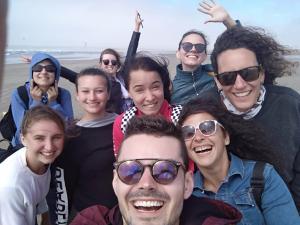Date/time
Date(s) - 15/06/2018 - 22/06/2018
All day
Locality
Woodstown, Ireland
Project type
Selected participants
- Guest User
- Guest User
feedback from participant:
“After a complicated start, when I got information that I was going to go on a project myself, because the other participant suddenly got sick, the project turned to a very successful, adventurous and full of new friendship.” The A Deeper Sense of Inclusion project worked very well for me , because our mentors were already very experienced, project was prepared very well, it included a lot of physical activities, which I very much appreciate. We communicated a lot between each others, that was one of the main pillars of the project. I learned a lot of new ways to communicate with people, how to tailor communications and make the most out of it. I consider activities focused on nonverbal communication as a big plus. “

Summary what was training about:
Inclusion is one of the biggest challenges faced by all EU member states. In the recent past, significant social upheaval has taken place across the continent. Huge numbers of people have moved into and across Europe, and this has led to an upsurge in radicalization, the creation of divisions, and the erection of both physical and mental barriers. Europe nowadays has more physical walls between countries than it had during the height of the Cold War.
This challenge of how to create a safe and inclusive Europe is a high priority in the Erasmus+ program: “Europe needs more cohesive and inclusive societies which allow citizens to play an active role in democratic life. Education and youth work are key to promoting common European values, fostering social integration, enhancing intercultural understanding, and creating a sense of belonging to a community, thus preventing violent radicalization. Erasmus+ is an effective instrument in promoting the inclusion of people with disadvantaged backgrounds.”
Youth workers are viewed as professionals for whom inclusion is an important part of their work – in particular ‘youth at risk’ is an important target group for youth workers. Young people who feel excluded and disappointed, with little confidence and self-esteem, are in danger of becoming involved with extreme groups. Youth workers deliver important outcomes with young people who have ‘dropped out’.
In this field, where the solutions are not immediately obvious, innovation and innovative ways of working are critically important in developing professionals and organisations.
The focus of this Training Course is on the stages before the problems start, using the methodology of Labyrinth Theatre, which is a proven, effective method to detect feelings, values and senses under the surface. It can be utilized as a prevention tool by stimulating feelings and commitments on a deeper level, which can help to avoid exclusion and isolation.
This European project is an opportunity to examine and reflect upon the issues around inclusion from different perspectives, to learn from different countries and cultures by sharing knowledge about new ways of working, and to clarify ideas around a common understanding of inclusion. It will also help to build a wider and better European network to tackle the challenges around how to be more inclusive within Europe.
Overall Aim
The overall aim of the Training Course is to increase the awareness of personal strengths and authenticity among youth workers during a personal journey of self-discovery. From this individual reflection, participants take the active step of commitment with each other by sharing and experiencing. Participants are stimulated to support the young people they work with and to guide them in their learning process as full, authentic persons. Our participants do this by applying their own learning process with their young people after the TC.
Objectives
• To support youth workers to become more aware of themselves, thus enabling them to make conscious choices and decisions that fit with the core of their identity and their goals in life
• To dive deeper into, and really experience concepts such as resilience, confidence, vulnerability, empathy and creativity
• To frame a learning process where youth workers feel commitment and inclusion by sharing and experience
• To provide youth workers with tools to support a deep connection with young people they work with
• Sharing tools and methods from across Europe, inspiring the participants to implement similar learning processes after the TC for their own target groups
• To reflect on their own learning process by using the Key Competences from the Youth Pass, and giving the opportunity for capacity building in the context of the Erasmus+ Program.
Participation in the project
If you would like to apply for project, please answer the following questions:
Pre tento projekt sme už vybrali účastníkov.


